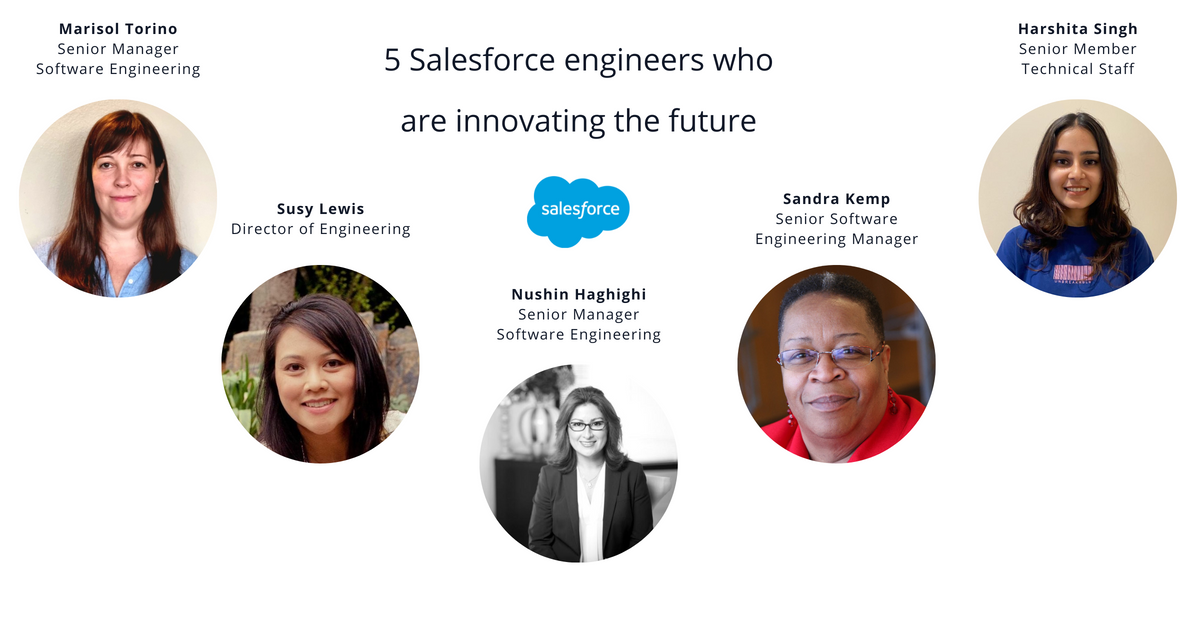Below is an article originally published on Salesforce’s blog. Visit the Salesforce company page on PowerToFly to see their open positions and learn more.
In our “Engineering Energizers” Q&A series, we examine the life experiences and career paths that have shaped Salesforce engineering leaders. This special edition spotlights five of the best and brightest minds within Salesforce Engineering and across the world – from India to Argentina. We dive deep into their passion for innovation, explore the skills that drive success within Salesforce Engineering, and much more.
How would you describe your engineering role at Salesforce?
Susy Lewis: I am a director of engineering, which means I lead multiple teams that are spread out across different countries who are building new features for our product sets. Even though they are all building different features, they are all working towards the same projects and product timelines.
Harshita Singh: I am an engineer on the Salesforce Data Cloud org, based in India. We enable companies to bring all of their data from several sources into a single source of truth — empowering them to build customer profiles, produce really cool insights, and segment their customers to provide targeted engagement. My big data processing compute layer team provides the muscle behind the big data processing that empowers customers with effective, reliable, and smart insights.
Harshita Singh
Nushin Haghighi: As a senior manager in Engineering, I oversee the teams developing some of the most critical features and capabilities around schema and modeling data in the Salesforce platform that enables our Salesforce admins, developers, and partners. I also work with product management and architects to deliver on our strategic programs and our product roadmap.
Marisol Torino: As a manager, I lead a team of six stellar engineers. Being a manager at Salesforce means dealing with a lot of things on your plate. That ranges from achieving my specific individual goals to making my team shine.
Sandra Kemp: As a lead member of the technical staff, I support the development teams to make sure that they’re delivering the best code, quality code, reduction in defects and determine any process improvements that are needed. I also ensure they have the proper tooling and are delivering quality work to our end customer.
Sandra Kemp
What do you like most about being a Salesforce engineer?
Nushin Haghighi: I admire Salesforce’s commitment to innovation. When you work for a company whose products are the number one in sales, number one in customer service, number one in marketing, number one CRM, number one in analytics, it says a lot about our innovative mindset and culture. And that mindset holds true in engineering.
Nushin Haghighi
Susy Lewis: It is kind of amazing to see how so many disciplines intersect to make our product successful. For example, to deliver a project, my team works with researchers who conduct many customer studies that help us define which product features are actually needed. We also work with user experience engineers, who define how customers should experience an entire product from beginning to end. And of course, we work with all the engineers who write and test the code.
Marisol Torino: I have two favorite things. First, the people here are amazing — super smart, humble, and helpful. Second, I live in a very small town in Argentina and I could never imagine that I would have the opportunity of working remotely for such a large company.
What does innovation mean to you?
Susy Lewis: It is all about implementing new solutions to problems that bring value to the users. My team is either innovating to find a new solution to an existing problem that we thought we solved five years ago or we may be developing new solutions to new problems.
Susy Lewis
Sandra Kemp: Innovation is the process of developing new processes, systems, technology for your customers. And it is important because technology continuously evolves. You think you’ve got the best product right now and it is innovative. Guess what? Your competitors may develop something even better. So we have to continuously grow, be innovative, and maintain that type of mindset. Salesforce really promotes that type of behavior.
Harshita Singh: I agree. We need to keep innovating. If not, our products could become irrelevant for newer use cases. I think that is the key differentiator for Salesforce. That is what sets us apart.
What is the top skill that engineers need to succeed at Salesforce?
Susy Lewis: Tenacity. So there are always going to be really hard problems to solve. And the people who seem to be the most successful recognize that they do not know everything. They know what they need to learn, understand how to use resources to find the information they need, and ask for help when they need it.
Harshita Singh: I would say agility because Salesforce engineers thrive in a dynamic environment. We do not shy away from change and being agile really helps us move fast and stay ahead of the curve.
What have you learned about leadership since joining Salesforce?
Nushin Haghighi: I have learned that leadership is a choice. It is not a title, it is not a role. It is a way of being, and you choose how you want to show up.
Susy Lewis: I agree. Leadership has nothing to do with titles. I have seen plenty of junior engineers who acted as leads by helping the team to develop new processes or practices that actually helped the team become more successful.
Marisol Torino: For me, I have learned to be a better coach. I used to always solve my team’s problems for them. Here at Salesforce, I learned that what I have to do is help people to find their own answers. And that is amazing.
Marisol Torino
How has Salesforce supported your career growth?
Sandra Kemp: They make sure you are onboarded, you understand the terminology and the way Salesforce does things and learn the product. They also encourage you to take classes and find a mentor that can help you through things.
Harshita Singh: Yes, the mentoring programs here are awesome. We also have an amazing women’s network that helps you connect with engineering leaders and learn from their experiences — inspiring you to be an effective leader yourself.
We also have a bunch of hackathons and tech summits that happen every quarter. And that is really cool because it helps you innovate and incorporate changes that you are really passionate about.
Join Salesforce’s Talent Community to stay connected to career opportunities. You can also follow Salesforce Jobs on Twitter, Instagram, and LinkedIn for more stories on their dynamic technology team.



